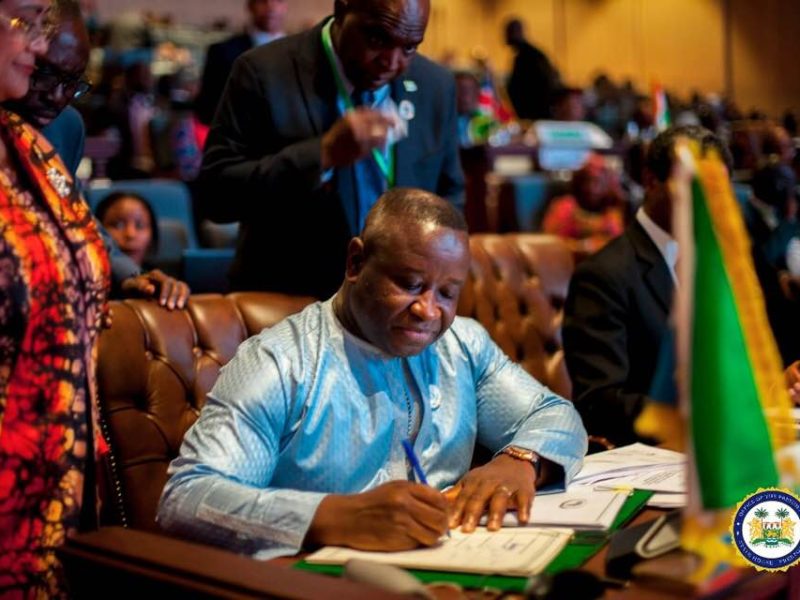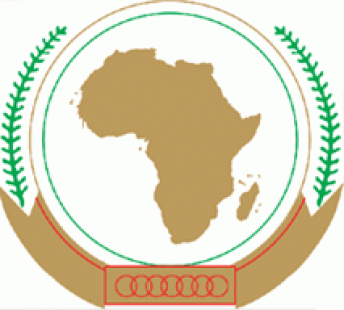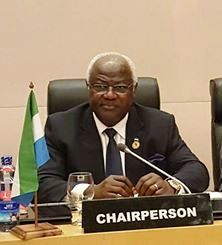Post-conflict and peace building workshop wraps up
A workshop on post-conflict, reconstruction, development and peace building in Africa wraps up today August 19 at the Bintumani Conference Hall.
The workshop looked at the challenges of countries emerging from violent conflicts and their impacts on socio-economic development in Africa. The African Union (AU) and the regional economic communities (RECs) have put enormous efforts in the facilitation of negotiation for peaceful resolution of existing conflicts and the effective implementation of peace agreements as witnessed in Burundi, the Central African republic CAR, the Comoros Cote d’Ivoire, the Democratic Republic of Congo DRC, Liberia, Sierra Leone, the Sudan and Somalia, among others.
As a result of these efforts there has been a steady decline in the number of active conflicts on the continent and an increasing demand for the consolidation of peace reconstruction and development.
However, experience has shown that in the early phase of transition from conflict to peace, the peace processes remain fragile with a high risk of resumption of violence. This is because countries emerging from conflict are characterized by weakened or non existent capacity at all levels destroyed institutions and the absence of a well structured policies underlying poverty. Furthermore, responses to post conflict situation have in the past remained fragmented and largely ineffectual.
For these reasons, the African Union is focusing more attention on measures that consolidate peace and pave the way for growth and regeneration. These AU efforts are informed by past practices of the Organization of African Unity in reconstruction efforts and all relevant OAU/AU mandates and decisions including Article 5 (2) of the Constitutive Act on the basis of which the Peace and Security Council PSC was established.
More specific is the mandate proffered by the protocol relating to the establishment of the PSC which was created to inter alia promote and implement peace building and post conflict reconstruction activities and to consolidate peace and prevent the resurgence of violence (Articles 3a, 6). Thus, peace-building, post-conflict reconstruction, humanitarian action and disaster management constitute core activities of the PSC. In view of this, the PSC protocol delineates a number of post-conflict reconstruction activities that require action, including the restoration of the rule of law, establishment and development of democratic institutions, and the preparation, organization and supervision of elections in the concerned member states (Article 14(1)).
This mandate is extended in countries affected by violent conflict to include the consolidation of the peace agreements that have been negotiated, establishing conditions of political, social and economic reconstruction of the society and government institutions (Article 14 (3)).
The Protocol also emphasizes the link between prevention of conflict and consolidation of peace and mandates the PSC to take all measures that are required in order to prevent a conflict for which a settlement has already been reached from escalation.
AU Post-Conflict Reconstruction and Development (PCRD) Policy
Based on these experiences and mandates, the Executive Council Decision EX.CL/191(VII) in Sirte, Libya, of July 2005, mandated the commission to develop an Africa Union (AU) policy on post-conflict reconstruction based on the relevant provisions of the PSC protocol and the experience gained thus far on the continent.
After a methodological and focused process and meeting between the technical experts, Governmental Experts, the CSO, and the RECs on PCRD, the Executive Council fully endorsed the Draft Policy Framework on PCRD in July 2006, during the 9th ordinary session of the Executive Council in Banjul, in its Decision (EX.CL/Dec.302[ix]), the Council requested the Commission, in collaboration with the Regional Economic Communities (RECs), relevant United Nations (UN), and African Non-Governmental Organizations (NGOs), to take all the necessary steps for the effective implementation of the PCRD Policy.
The objective of the AU PCRD policy is to improve timeliness, effectiveness and coordination of activities in post conflict countries and to lay the foundation for social justice and sustainable peace, in line with Africa’s vision of renewal and growth. The policy serves as a tool to:
- Consolidate peace and prevent relapse of violence;
- Help address the root causes of conflict;
- Encourage and fast-track planning and implementation of reconstruction activities; and
- Enhance complementarity and coordination between and among diverse actors engaged in PCRD processes.
Stay with Sierra Express Media, for your trusted place in news!
© 2010, https:. All rights reserved.






